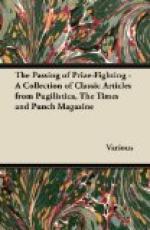OUR BOOKING-OFFICE.
Speaking of Reynart the Fox, I was made, by a slip of the printer’s hand—I am accustomed to seeing slips from his hand, which is quite another thing—to say that this mediaeval romance “presents a truer picture of life than novels in which vice is punished and virtue patiently rewarded.” After considering for some time what on earth I could have meant by “patiently rewarded,” I remembered that I had written “patently rewarded.” The printer put my “i” out; and without an “i” it was very difficult to perceive the sense of the phrase.
[Illustration]
Nutshell Novels, by that crack writer—no, not “crack’d”—and poet, whose verses send a frill right through us, Mr. J. ASHBY-STERRY, are coming out. Capital title. As SHAKSPEARE says, “Sermons in stones, novels in nutshells, and good in everything.” SHELLEY’S poems might be brought out in pocketable form under a similar title, Nut-Shelley Poems. I have not yet seen the volume in question, only heard tell of it, and should not be surprised to hear that the central novel and the best was a short military novel, entitled The Kernel. Messrs. HUTCHINSON & Co. are the publishers. I hope Mr. STERRY has illustrated them himself. He can draw and paint, but he won’t, and there’s an end on’t. He must follow up the Nutshells with a volume of Crackers, about Christmas time.
Just been looking through London Street Arabs, by Mrs. H.M. STANLEY, published by CASSELL & Co., which firm—whose telegraphic address is “Caspeg, London,” and a good name too—writes to the Baron thus:—“In forwarding you an early copy”—small and early—“of Mrs. Stanley’s book, we will ask you to be good enough”—("I am ‘good enough’” quoth the Baron)—“to confine your extracts from the Introduction to an extent not exceeding one-third of the whole.” “Willingly, my dear ‘Caspeg,’” replies the Baron, who does not like being dictated to, and, to gratify your wish to the utmost, he will make no extracts at all from the book, a proceeding which ought mightily to delight “Caspeg, London.” What next? Will publishers send to the Baron, and request him not even to breathe the names of their books? By all means. He has no objection, as, whether sent to him for review, or purchased by him pour se distraire, the Baron only mentions those he likes, or, if he mentions those he dislikes, ’tis pro bono publico, and there’s an end on’t. Mrs. STANLEY appreciates humour, as the following anecdote will show—But, dear me, the Baron is forgetful—he begs “Caspeg’s” pardon; he mustn’t quote. Mrs. STANLEY can be truly sympathetic with sorrow, as the following story proves—no, “Caspeg,” the story must not follow. Never mind—the Baron’s dear readers will read it for themselves if they feel “so dispoged.” The Baron supposes that all this was written and drawn while Mrs. STANLEY was




